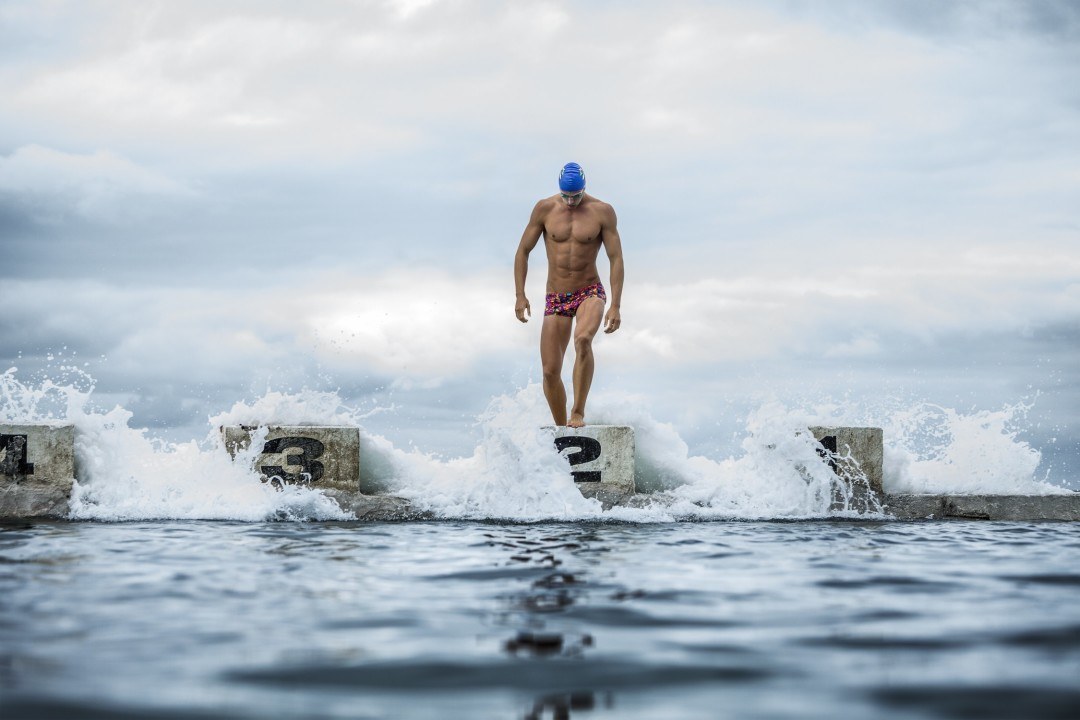by Olivier Poirier-Leroy. You can join 9,000+ swimmers and coaches who read his motivational newsletter last week by clicking here.
Regret. We all experience it in varying degrees of intensity over the course of our swimming careers.
The couldas, the wouldas, and the shouldas.
We have each experienced those moments where we look back at our swimming (and lives, for that matter) and wondered “what if.”
- What if I had trained hard for a full year?
- What if I had showed up to all those morning workouts?
- What if I hadn’t choked at state earlier this year and won the relay for the team?
- What if I had gone to bed earlier last night and gotten a full night of recovery—inducing sleep?
The choices and actions we regret are endless, and so are the possible outcomes that we imagine. (Think Uncle Rico in Napoleon Dynamite: “How much you wanna bet I can throw a football over them mountains? …Yeah… Coach would put me in the fourth quarter, we would’ve been state champions. No doubt. No doubt in my mind.”)
And while the regrets may pile up, and the fantasized outcomes may linger (sorry Uncle Rico, your moves weren’t that good), you can actually use this line of thinking—called counterfactual thoughts—to help propel you forward and make productive changes in your swimming.
What are counterfactuals? And why do they sound like geometric figures?
Think of counterfactuals as the evaluations and judgements you make about past events.
A unique characteristic about these bad boys is that counterfactuals are very rarely dispassionate or accurate. (I’m looking at you, Uncle Rico.)
Instead, with counterfactuals we create recollections that are either preferable or worse than what actually happened. The preferable outcomes, upward counterfactuals, are what leads to the feeling of regret. The worse outcomes—where we justify the past event by comparing it to an even more awful scenario— falls under the umbrella of downward counterfactuals.
Okay, enough with the definitions, nerd-boy. How does this relate to my swimming?
Let me illustrate with an example—
Your morning heats swim for the 200m freestyle went well, but you paced it terribly. As a result, you missed making a second swim by half a second.
Downward counterfactual thinking would lead to a thought such as: “Well, I could have swum it worse. At least I didn’t get DQ’d. And at least my suit didn’t fall off.” While this has the feint scent of optimism, and can certainly temporarily improve your mood, it doesn’t spur any type of inclination to modify behavior. It leads to a sense of inertia, of powerlessness, and leads you to accept the situation “as is.” In other words, it doesn’t invoke any desire to change moving forward.
Upward counterfactual thinking, on the other hand, is more likely to make you feel regret over the swim, but it will also sting enough to make you realize that you need to change moving forward, and that you need to be more aware of your pace strategy. In other words, via the pain/sting of the performance (“I should have paced my swim the way I originally set out to do, now I won’t get a chance to medal at finals.”), you are incentivized to make changes in order to not experience it again.
Use the sting
Anytime things don’t go well for us in the pool it is natural to want to brush it off. To think that it could have been worse.
Instead, embrace the sting, think about how it can and will be better, and use the R-word and less-than-awesome results between the lane lines to propel you to do good—both in the pool and in life.
Will you (or are you already) using regret as a motivating force for success in the pool? Let me know in the comments below.
About YourSwimBook
 YourSwimBook is a log book and goal setting guide designed specifically for competitive swimmers. It includes a ten month log book, comprehensive goal setting section, monthly evaluations to be filled out with your coach, and more. Learn 8 more reasons why this tool kicks butt.
YourSwimBook is a log book and goal setting guide designed specifically for competitive swimmers. It includes a ten month log book, comprehensive goal setting section, monthly evaluations to be filled out with your coach, and more. Learn 8 more reasons why this tool kicks butt.
Join the YourSwimBook weekly newsletter group and get motivational tips and more straight to your inbox. Sign up for free here.

The biggest woulda, coulda, shoulda for so many swimmers I know came down to one thing…
$$$ to train post college/university without parental support.
+ 1
Does that mean the swimmer wanted after college but had to quit because of a lack of money? Sorry, just want to make sure I understand. Thank you!
I believe that’s what’s Bo talking about, yes.
As a guy who’s not studying at a US college, having to ask my parents for $$$ just so I could keep swimming with my club team is embarrassing for me. Particulary so because most of my colleagues from school have student jobs and I don’t have time for something similar because swimming takes up 4+ hrs of my day